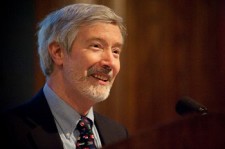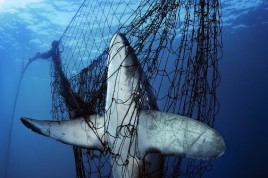The new book, Overdevelopment, Overpopulation, Overshoot takes on the our ballooning population in a unique and visually hitting way. With provocative photos from around the world, OVER (for short) presents a collection of photos that show just how our human numbers and behavior have impacted Earth. Essays and narrative by prominent experts accompany the photos. In addition to the images, here are some quotes that particularly struck me:
From William Ryerson’s (founder and president of Population Media Center and CEO of The Population Institute) Introduction:

William Ryerson
“The Global Footprint Network estimates that human already use 150% of the Earth’s renewal capacity annually, and it estimates further that by 2030 we will need two planets to sustain us.”
“Scientists tell us that we are exterminating our fellow plant and animal species at a rate that is 100 or even 1000 times faster than the natural rate of extinction.”
From the Demographic Explosion chapter:
At the start of the Industrial Revolution, “a convergence set the stage for a demographic explosion….the modern era’s exploitation of this energy windfall has coincided with a suite of rapid advances in agricultural productivity, science, and medicine that have lowered death rates and increased life spans, leading to ballooning human populations around the globe.”
From the Human Tide chapter:
“Every pressing problem, from poverty to malnutrition to biodiversity loss and climate change, is linked to human numbers and behavior.”
From the Urban Animal chapter:
“Humans evolved in wild nature…In 2008, for the first time in history, the majority of humans on Earth lived in cities. We had become, at least superficially, urban animals.”
“Not until man sees the light and submits gracefully, moderating his homocentricity; not until man accepts the primacy of beauty, diversity, and the integrity of nature, and limits his domination and numbers, placing equal value on the preservation of natural environment as on his own life, is there hope that he will survive.” (– Hugh Iltis)
From the Material World chapter:
“It makes no sense to elevate economics above the biosphere.” (– David Suzuki)
From the Trashing the Planet chapter:
“Put simply, if we do not redirect our extraction and production systems and change the way we distribute, consume and dispose of our Stuff – what I sometimes call the take-make-waste model, the economy as it is will kill the planet.” (– Annie Leonard)
From the Nature’s Unraveling chapter:
“I don’t understand why when we destroy something created by man we call it vandalism, but when we destroy something created by nature we call it progress.” (- Ed Begley Jr.)
 From the Wildlife Lost chapter
From the Wildlife Lost chapter
(I have to say – the images in this chapter really got me – brought me to tears.)
“The International Union for Conservation of Nature lists some 20,000 species that are threatened with extinction.”
“Humanity’s assault of wildlife isn’t new, but 7+ billion people armed with advanced technology…are simply more lethal to wildlife now than in any point in history.”
“The massive growth of the human population through the 20th century has had more impact on biodiversity than other single factor.” (– Sir David King)
From the Climate Chaos chapter:
“There are many ways in which we wound wild Earth and kill wild things. But behind them all is Man swarm – our population boom. Even in the short run, we cannot keep wilderness and wildlife without stopping Man’s growth. Furthermore, it is nothing less than a lie we tell ourselves that we can stop climatic weirdness without lowering how many we are on the Earth.” (– Dave Foreman, with whom I worked on the new edition of Man Swarm!)
“What has become clear from the science is that we can not burn all of the fossil fuels without creating a very different planet.” (– James Hansen)
From the Lord Man chapter:
“The earth is more than a storehouse of resources for Us.”
We need to return to where actions were “judged ethical or not by whether they helped sustain beauty, biodiversity, and health.”
Afterword, by Eileen Crist, professor at Virginia Tech
If we averaged one child, the population “would stabilize and begin descending to two billion.”
If the current generation embraced a voluntary mandate for the sake of a “living planet and quality of life (perhaps even survival) of future people, how could this possibly be construed as a sacrifice?”
“It is an intelligent and compassionate action that many people would be willing to take if they became properly informed and knowledgeable about the planetary emergency we are in.”
“…what is detaining us from creating a civilization in harmony with wild Earth?”
As the saying goes, “A picture is worth a 1000 words.” In this book, each picture is worth 1000 words to be sure, on behalf of the state of our overpopulated world.

